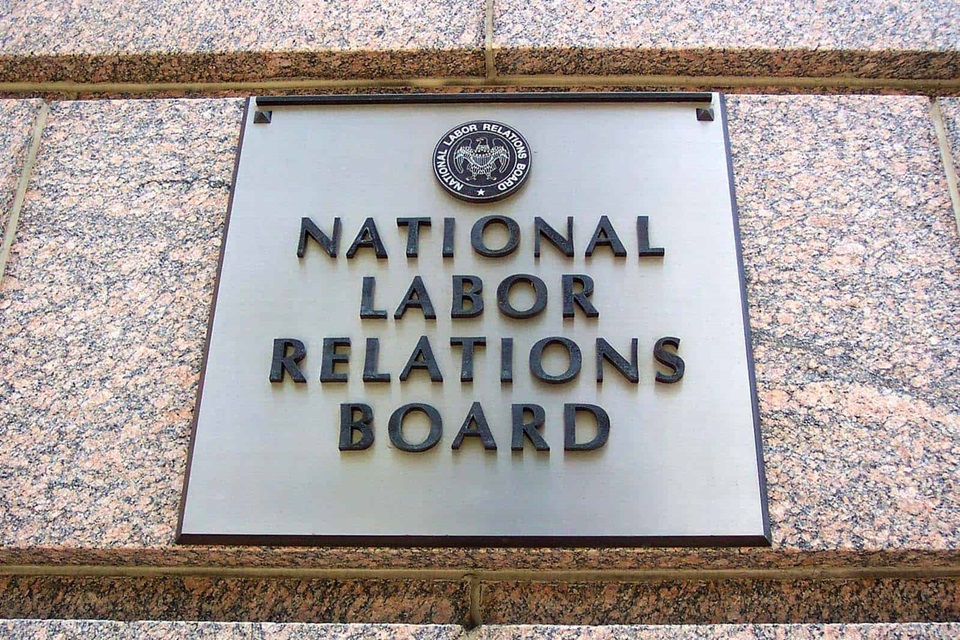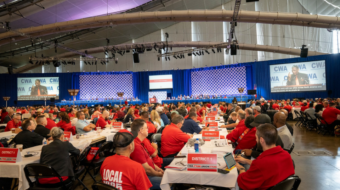
WASHINGTON—Attempting to put an end, once and for all, to a controversy that has swirled for more than a decade, the National Labor Relations Board issued what it calls “a common law”—and common sense—rule on when joint employers are jointly responsible for obeying or breaking labor law.
The mandate, to take effect December 26, says that when two employers—think a local McDonald’s franchise and McDonald’s headquarters in Chicago—control a worker’s toil, from wages and hours to duties and work rules to hiring and firing to uniforms and training, then both are responsible for obeying or breaking labor law.
That means it should be easier for workers to organize and bargain without being bounced from pillar to post when it comes to whom to bargain with or complain about.
Using that same “basic common sense” explanation, AFL-CIO President Liz Shuler called the new rule “an important win” for workers.
“The point of the rule is simple—when workers negotiate for fair wages and working conditions, companies shouldn’t be able to hide behind a subcontractor or staffing agency to deny us what we’ve rightfully earned.
“Today, too many employers use intermediaries like staffing firms or temp agencies to evade their responsibilities under the law. This rule ensures union members can bargain with each company that has the power to make changes in the workplace.
“The right to collectively bargain is nonexistent if the company that has the power to change workers’ terms and conditions of employment isn’t negotiating with workers.”
As might be expected, Republicans screamed the rule would hurt alleged “small businesses,” with Sen. Bill Cassidy, R-La., the top Republican on the Senate Labor Committee, introducing legislation to overturn it. He’s using the Congressional Review Act, which Republicans first used in 1995 to permanently kill OSHA’s ergonomics rule. Renegade Sen. Joe Manchin, D-W. Va., joined Cassidy.
The whole controversy actually did start at McDonald’s, when the Restaurant Opportunities Center tried to organize workers at one restaurant—and the owner denied responsibility for obeying labor law, shifting it to Chicago, which then shifted it back.
Gone back and forth
The NLRB itself has gone back and forth, depending on whether Democrats or Republicans are in the board majority. The Republican Trump regime in 2020 tried to fog the issue, and the responsibility, with a rule saying only the boss with “direct and immediate control” had to obey labor law, but federal courts bounced that, opening the way for this rule, published in the Federal Register.
“The board believes this rule will more explicitly ground the joint-employer standard in established common-law agency principles and provide guidance to” workers and businesses “regarding their rights and responsibilities when more than one statutory employer possesses the authority to control or exercises the power to control particular employees’ essential terms and conditions of employment,” the board said. It voted on party lines for the final rule.
“Under the final rule, an entity may be considered a joint employer of another employer’s employees if the two share or codetermine employees’ essential terms and conditions of employment.”
The agency explained common law, which it’s grounding its rule on, says that when one or more employers control a worker’s wages, benefits, working conditions, hiring, firing, safety and health, promotions, and other indications of control, both are responsible for obeying labor law when they do so—and the worker(s) can organize as a result.
“The common law… permits consideration of those forms of indirect control that play a relevant part in determining the essential terms and conditions of employment,” the board said in the court case, involving Browning-Ferris Industries, that overturned the Trump regime’s try at making the rule vague and thus tougher for workers
“The definition of ‘employer’” in labor law “textually indicates” the NLRA “looks at all” indications “of employer status, whether exercised ‘directly or indirectly.” Indirect employers, the board’s rule says, are joint employers of workers.
The Restaurant Opportunities Center, whose case involving McDonald’s years ago set off the whole long wrangle, had no immediate comment, but the National Employment Law Project weighed in on the issue when the board proposed the rule last year, and NELP General Counsel Cathy Ruckelshaus’s comment is still relevant.
“The NLRB’s new proposed joint-employer rule will make it easier for employees who work for a contractor, staffing or temp agency, or franchise, to drag the big companies higher up the employment chain into labor disputes,” said Ruckelshaus.
In plain terms, McDonald’s headquarters would be responsible for obeying or breaking labor law if workers at a local franchise tried to organize and bargain—and so would the local boss.
Board Chair Lauren McFerran, in announcing the rule, which she voted for, issued cautions. One is that it wouldn’t be retroactive. The other is the NLRB would still decide joint employer disputes case by case.
“The board’s new joint-employer standard reflects both a legally correct return to common-law principles and a practical approach to ensuring the entities effectively exercising control over workers’ critical terms of employment respect their bargaining obligations under the NLRA,” she wrote.
“While the final rule establishes a uniform joint-employer standard, the board will still conduct a fact-specific analysis on a case-by-case basis to determine whether two or more employers meet the standard.”
We hope you appreciated this article. At People’s World, we believe news and information should be free and accessible to all, but we need your help. Our journalism is free of corporate influence and paywalls because we are totally reader-supported. Only you, our readers and supporters, make this possible. If you enjoy reading People’s World and the stories we bring you, please support our work by donating or becoming a monthly sustainer today. Thank you!










